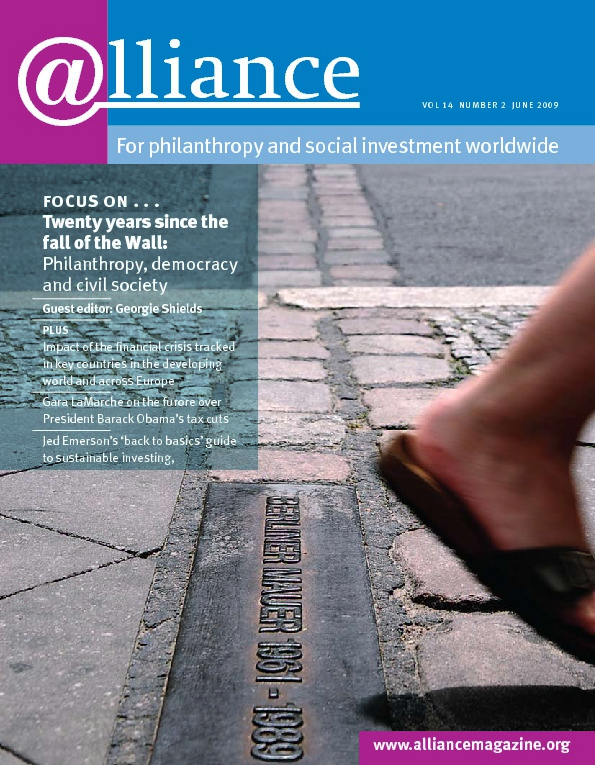The Trust for Civil Society in Central and Eastern Europe (CEE Trust) has decided to mark the anniversary of the democratic sweep in 1989 with a Civil Society Forum, which will aim to explore the relationship between the public good, democracy and civil society. In preparation for the Forum, we undertook surveys in Bulgaria, Hungary, Poland, Romania and Slovakia.
We held two focus groups in each country, one composed of NGO practitioners, the other of non-organized active individuals (bloggers, journalists, academics, participants in street protests, etc). Participants were asked to identify their biggest concerns regarding democracy and civil society.
Non-participation of citizens, apathy, and lack of readiness for collective action came in first place in each country. For a grantmaking organization such as the CEE Trust, with a mission to support the existence of healthy civil societies, the question is to what extent citizens’ groups and NGOs can address such concerns. A second area of concern that emerged was the growing appeal of nationalist/populist/illiberal ideas in public life, especially among young people. A certain disappointment with NGOs, the backbone (or rather the form of existence) of civil society, to counter these tendencies was also discernible among the non-organized activists, as well as a more general disillusion about the speed with which democracy will ‘produce’ a good society.
The last 20 years have brought indisputable evidence that in many areas such as human rights protection, rule of law, advocacy on behalf of disadvantaged groups, social services, development of new policies and practices, and civic education NGOs have played a crucial role. But the work is far from accomplished. While most of the institutions and infrastructure of healthy democracies are in place, the enormous task of making democracy work for all, and having human rights protection and the rule of law govern every aspect of life, still looks like a long-term project.
Meanwhile the environment within which the CEE countries exist has changed dramatically. Accession to the EU has provided both a solid framework of principles, regulations and mechanisms and a source of significant financial support in key areas including the rule of law and citizens’ participation. This new source of funding is raising valid questions about the role of, and need for, private foundations, foreign and domestic. I would now like to offer two examples of the CEE Trust’s work, which I hope may suggest a niche for private foundations.
In all seven countries where the CEE Trust operates it supports organizations that engage in activities such as challenging government non-compliance with legislation, helping individual citizens to fight business malpractice, and countering attempts to limit freedom of expression or access to public information. The outcome of this work might be the establishment of better practices by courts and, not infrequently, amendments of legislation or regulations. It is labour-intensive, highly expert, long-term, often frustrating work, mostly invisible to the public. It is hoped that by restoring public trust in justice it will not only strengthen democracy but gradually increase the engagement of citizens with public issues. As in any legal battle, independence is crucial – many organizations engaged in this kind of work do not accept money from government. Supporting this work thus seems to be a valid role for the CEE Trust and other private foundations, which have the advantage of being independent of government and business.
The CEE Trust, along with several European foundations, is also engaged in efforts to motivate citizens to participate in public life. Setting up new patterns for consulting citizens and promoting different networks (of donors, organizations working for people with rare diseases, watchdog organizations and many more) are two well-established approaches. The CEE Trust aims to seek and encourage a wide range of approaches, some traditional, others less so. Giving larger grants to a few established organizations with experience in regranting and a good knowledge of the local situation, for instance, makes it possible to reach real grassroots groups. ‘Small grants for big changes’ is one project of this kind: the local organization identified 52 local initiatives in one town of 100,000 inhabitants and supported a dozen of them out of a total budget of $34,000. In this area private foundations’ flexibility to pursue different strategies is a clear advantage.
The Polish scholar and statesman Bronislaw Geremek once remarked that fighting for democracy has much greater appeal than working for democracy. Some of the activities supported by the CEE Trust outlined above can appear lackluster or incomprehensible to the general public. Others generate immediate sympathy but do not provide measurable outcomes and can hardly be described as strategic. In both cases, I truly believe that foundations’ independence and flexibility give them a big advantage compared to public donors. We hope the coming Civil Society Forum will help us further understand how we can make full use of these advantages to support democracy and civil society for the long haul.
Rayna Gavrilova is Executive Director of the CEE Trust. Email rayna.gavrilova@ceetrust.org
For more information
On the CEE Trust: http://www.ceetrust.org
On the Forum: http://www.csf.ceetrust.org
 openDemocracy focuses on democracy promotion
openDemocracy focuses on democracy promotion
Can democracy be promoted, and by whom? What circumstances and methods are most favourable to the enduring success of the effort?
These questions underlie a debate co-hosted by the independent news analysis website openDemocracy.net and International IDEA, inspired by the contrasting experience of the last two decades. Since 1989 democracy has broken new geographical ground, but the post-9/11 era has seen the democracy ‘project’ threatened by a climate of fear, international conflict and authoritarian resurgence.
The debate offers a resource to help assess the state of ‘democracy promotion’. It presents detailed reports and analysis from writers throughout the world on issues including democracy in the Muslim world, events in Moldova and gender and democracy in Zimbabwe.
Join the discussion at http://www.opendemocracy.net/idea
 Irina Bota – What democracy means to me
Irina Bota – What democracy means to me
To begin with, I wouldn’t call a country democratic if it failed to provide its citizens with either free and fair elections or fundamental rights and freedoms. However, I think there is a distinction to be made between what democracy offers as rights, such as the right to vote, freedom of speech and freedom of association, and what it offers as opportunities – actually casting a vote, participating in your community or becoming part of an association, to mention a few. While we should expect – and, if not, demand – to have the rights guaranteed, the opportunities we need to take ourselves.
How important are civil society organizations?
I do believe civil society organizations have played a role in achieving democracy in my country, most significantly as watchdogs, raising the alarm when democracy seemed to be derailing. However, most of their successes in safeguarding democracy have been achieved by engaging with politics and national level institutions, and not by interacting with and mobilizing the citizenry. This is also evident, I think, in the degree to which they have managed and still manage today to provide avenues for participation. On the one hand, it’s understandable in that, for the greater part of the two decades since the fall of communism, the quest for increased citizen participation has been regarded as secondary to protecting fundamental rights and freedoms. Only in recent years, when such rights appear to be relatively secure, has citizen participation moved up the agenda.
On the other hand, this tendency has meant that today, in my opinion, many important civil society organizations are regarded by the public as belonging to a quasi-political sphere, detached from citizens’ own interests and to a certain degree beyond their reach. Consequently, it seems to me that they fail in, or at least struggle with, their role as links between citizens and politics.
What opportunities do you have to participate in your community and your country?
The opportunities for participation are there, but they are limited. Civic participation in Romania is confined to a rather small number of civil society organizations and activists, and almost non-existent at the grassroots. What is worse, most of the active organizations are concentrated in the larger cities. This leaves the individual citizen with limited opportunities – and, equally important, with limited resources – for participation. One option is to join an organization, but at the local level NGOs are scarce, if they exist at all.
The other options, single-handed action or attempts to mobilize fellow citizens, are bound to meet with resistance, both from citizens themselves and from the institutions they need to interact with in order to influence decision-making. It’s like a vicious circle, in which institutions, such as city halls or local councils, are not prepared to respond to citizen participation, and citizens do not participate because they fear hostility from the institutions. Some NGOs have started to take small steps to try and break this circle. But like any changes that are institutional as well as cultural, I think it’s going to be a very long, hard process. As an individual citizen, looking at the opportunities for participation in front of me, I say, ‘I’ll take whatever I can get and see how I can improve them.’ I think this is the view of a too-small minority in Romania. But personally, I’m hopeful.
Irina Bota comes from Romania and is currently doing a Masters in Political Science at Oxford University. Email irina.bota@yahoo.com





Comments (0)